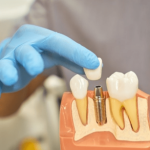Do you often wake up with jaw pain, headaches, or worn-down teeth? If so, you might suffer from a condition known as bruxism, characterized by teeth grinding or clenching during sleep. Bruxism can significantly impact your sleep quality and overall well-being. However, a solution can help alleviate these issues: a dental guard, commonly known as a night guard.
In this article, we will explore how wearing a dental guard can improve your sleep quality and provide tips on getting better sleep with this essential oral instrument.
Understanding Bruxism and Its Effects on Sleep
Bruxism is a severe condition that affects both children and adults, causing them to involuntarily grind or clench their teeth during sleep. The root cause of bruxism is still unknown, but factors such as stress, anxiety, sleep disorders, and misaligned teeth can contribute to its development. The grinding and clenching actions exert excessive force on the teeth and jaw, leading to various dental and health problems.
One of the major consequences of bruxism is poor sleep quality. Teeth grinding and clenching can interrupt your sleep cycle, leading to frequent awakenings throughout the night. As a result, you may experience excessive daytime sleepiness, fatigue, and difficulty concentrating. Bruxism can also cause headaches, jaw pain, and facial muscle soreness, further affecting your ability to sleep soundly.
The Role of Dental Guards in Improving Sleep Quality
A dental guard is a custom-made oral appliance that fits over your teeth, acting as a protective barrier between your lower and upper jaws. It helps to reduce the impact of grinding and clenching, preventing damage to your teeth, jaw joint, and surrounding muscles. Additionally, wearing a dental guard can have a positive impact on your sleep quality by addressing the following issues:
- Teeth Protection: Dental guards provide a cushioning effect, absorbing the excessive force exerted during teeth grinding. It helps to prevent tooth wear, fractures, and enamel damage, ensuring your teeth remain healthy and strong.
- Jaw Alignment: By aligning your jaw in a proper position, dental guards alleviate the strain on your temporomandibular joint (TMJ) and surrounding muscles. It can help reduce jaw pain and tension, allowing for a more relaxed sleep experience.
- Muscle Relaxation: Dental guards promote muscle relaxation by discouraging clenching and grinding movements. Relaxed muscles lead to reduced facial pain and improved comfort during sleep.
Tips for Getting Better Sleep with a Dental Guard
While dental guards effectively manage bruxism and improve sleep quality, some adjustments and habits can further enhance their benefits. Here are a few tips to help you get better sleep while wearing a dental guard:
- Establish a Relaxing Bedtime Routine: Engage in calming activities before bed, such as taking a shower, reading, or practicing relaxation techniques like deep breathing. It helps prepare your mind and body for a restful sleep.
- Create a Sleep-Friendly Environment: Ensure your bedroom is quiet, dark, and at a comfortable temperature. Consider using earplugs, eye masks, or white noise machines to block out any disturbances that may disrupt your sleep.
- Practice Good Sleep Hygiene: Stick to a sleep schedule, go to bed, and wake up early at the same time every day. Avoid consuming excessive caffeine or alcohol close to bedtime and limit screen time before sleep.
- Keep Your Dental Guard Clean: Properly clean and store your dental guard as per your dentist’s instructions. Maintaining good oral hygiene and ensuring your dental guard is free from bacteria or debris will promote better oral health.
- Allow Time to Adjust: It may take a few nights to get used to wearing the dental guard while sleeping. Initially, you might experience some discomfort or feel something foreign in your mouth. However, your mouth will adjust with time, and the dental guard will become more comfortable. It’s important to be patient during this adjustment period and give yourself time to adapt.
- Seek Professional Guidance: To ensure the best fit and effectiveness of your dental guard, it’s essential to consult with a dental professional. Dentists can provide a custom-made dental guard tailored to your mouth and bite. They will take impressions of your teeth to create a precise and comfortable fit. Regular visits to your dentist will also allow for adjustments or replacements as needed.
- Practice Stress Management Techniques: Stress and anxiety are common triggers for bruxism. Implementing stress management techniques and tips into your daily routine can help reduce teeth grinding and improve sleep quality. Engage in activities such as exercise, meditation, yoga, or therapy to alleviate stress and promote relaxation before bedtime.
- Avoid Stimulants and Unhealthy Habits: Certain substances can exacerbate bruxism and disrupt sleep. Avoid consuming caffeine, nicotine, and alcohol, especially in the evening. Consuming these substances can interfere with your ability to relax, disturb the sleep cycle, and may increase the likelihood of teeth grinding. Limit or eliminate chewing on non-food items like pens or pencils during the day, contributing to jaw tension.
- Consider Adjunctive Therapies: In addition to wearing a dental guard, other therapies can complement your efforts to improve sleep quality. For example, acupuncture, physical therapy, and massage can help relieve muscle tension and promote relaxation in the jaw and surrounding areas. Talk to your healthcare provider about potential adjunctive therapies that may benefit your situation.
FAQs
-
How long does it take to adjust to wearing a dental guard while sleeping?
The adjustment period for wearing a dental guard can vary from person to person. Initially, you may experience some discomfort or feel something foreign in your mouth. However, with consistent use, most individuals adapt within a few nights to a few weeks. It’s important to be patient and allow your mouth to adjust gradually. If you continue to experience discomfort or have concerns, consult your dentist for guidance.
-
Can I buy an over-the-counter dental guard or a custom night guard online?
While there are over-the-counter dental guards available, getting a custom-made dental guard from a dental professional is generally recommended. Custom-made guards provide a better fit and are specifically tailored to your mouth and bite, ensuring optimal comfort and effectiveness. Dentists take impressions and measurements of your teeth to create a precise fit, reducing the likelihood of discomfort or shifting during sleep. Additionally, regular visits to your dentist allow for adjustments or replacements if needed.
-
Can wearing a dental guard completely cure bruxism and its effects on sleep?
Wearing a dental guard can effectively manage the symptoms of bruxism and improve sleep quality, but it may not completely cure the underlying cause. Bruxism can be multifactorial, with stress, anxiety, or misaligned teeth playing a role. While a dental guard protects your teeth and jaw, it’s important to address the root causes of bruxism for long-term relief. It may involve stress management techniques, therapy, or dental treatments to address misalignment. Consult your healthcare provider for a comprehensive approach to managing bruxism and improving sleep quality.
To Sum Up
Say goodbye to restless nights and wake up refreshed, with improved comfort and protection for your teeth. Don’t hesitate to take the necessary steps to achieve better sleep and optimal oral health. Contact your dentist today and inquire about Clear Comfort Night Guards for teeth grinding guards for sale. Experience the difference they can make in your life and wake up to a brighter, healthier smile.









